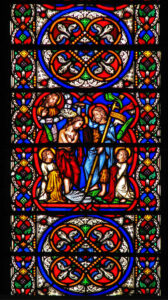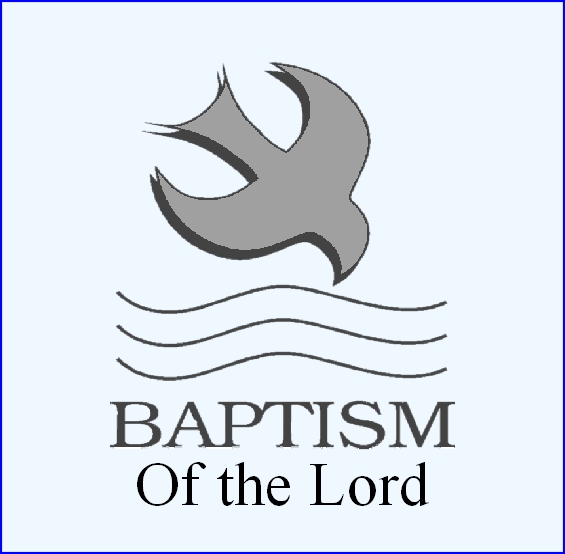You are my beloved Son; with you I am well pleased
10 January 2021
Isaiah 55:1-11
Acts 10:34-38
Mark 1:6-11
A few days ago we celebrated the Feast of the Epiphany, the manifestation of the Light of Christ to the Gentile world. Today we are also celebrating an epiphany – the manifestation of Jesus’ identity and mission on the occasion of his baptism by John. This moment marks the beginning of Jesus’ public life and ministry as he sets out to do the Father’s will and proclaim in word and deed the Kingdom of God. He is acclaimed from heaven by the voice of the Father and the presence of the Spirit. As followers of Christ who have heard his preaching, accepted his call, and set out to follow his way, we, too, can take to heart the words addressed to Jesus: ‘You are my beloved Son, with you I am well pleased.’ Baptised in Christ, we are beloved daughters and sons.

Homily
In his account of the baptism of Jesus by John, Mark’s concern is with the identity of Jesus. As Jesus emerges from the waters of the Jordan, a voice from heaven acclaims him with the words: ‘You are my beloved Son; with you I am well pleased’ (Mk 1:11). The words ‘You are my beloved Son’ echo Psalm 2:7, one of the royal psalms used for the coronation of the Kings of the House of David. Hence, these words point to Jesus as the promised Messiah. The words ‘With you I am well pleased’ echo the words of Isaiah 42:1, and thus point to Jesus as the ‘suffering servant of Yahweh’. Jesus’ baptism was a threshold experience for him, a moment of radical change, after which his life would never be the same again. He leaves behind the quiet obscure life of a carpenter’s son, his hidden years with Mary and Joseph, during which, as St Luke tells us, ‘he grew in wisdom and grace before God and people’ (Lk 2:52). He is now embarking on his messianic vocation in the service of God’s Reign.
I want to reflect for a moment on what living out this vocation would entail. Jesus was about to launch a revolutionary movement which would turn Israel and the world up-side-down. He would finally establish God’s rule of justice, peace, truth and love in Israel and (through Israel) among all nations on earth. However, he would not choose any of the ways his contemporaries envisaged God’s rule being established. He would reject the politics of violent revolution (adopted by the Zealots); of easy compromise (the option of the Jerusalem elite) and of narrow nationalism (advocated by the Pharisees). He would choose instead the path of redemptive suffering, as portrayed by the prophet Isaiah.
His way would be to turn the other cheek, to walk the second mile and to take up the cross. He would defeat evil by letting evil do its worst to him, by suffering evil in love and forgiving his enemies. In obedience to the will of his Father, he would identify with sinners and outcasts, with the poor and downtrodden, and exercise a ministry of compassion and forgiveness, healing and hope. In Jesus’ Kingdom ministry, as the renowned biblical Scholar, Tom Wright puts is, ‘we see the biblical portrait of Yahweh come to life: the loving God, rolling up his sleeves to do in person the job that no one else could do, the creator God giving new life; the God who works through his created world, and supremely through his human creatures; the faithful God dwelling in the midst of his people; the stern and tender God relentlessly opposed to all that destroys or distorts the good creation, especially human beings, but recklessly loving all those in need and distress.’ (The Challenge of Jesus, p. 90).
As we celebrate the baptism of Jesus and reflect on its significance, let us also recall our own baptism, and renew and deepen our baptismal commitment. We have been baptised, not with the baptism of John, but with the baptism of Jesus. We have been christened (what a beautiful word!) and empowered with the spirit of Christ. We have been entrusted with continuing the liberating, healing and transforming mission of Jesus. Tom Wright uses a striking image to capture the relationship between our mission and that of Jesus. ‘We are’, he says, ‘like musicians called to play and sing the unique and once-only-written musical score. We don’t have to write it again, but we have to play it’ (The Challenge of Jesus, p. 140).
How can we do this? Some ways are suggested by Fr Sylvester O’Flynn’s in his Reflection for today’s feast, published in this week’s Irish Catholic. I take the liberty of slightly modifying his words:
‘God alone can give faith, but we can offer witness.
God alone can give hope, but we can pass it on to others.
God alone can give peace, but we can work for unity.
God alone can give power, but we can sustain somebody feeling low.
God alone is the way, but we can show it to others.
God alone is the light, but we can make it shine for others.
God alone is life, but we can give others a taste for living.
God alone can do the impossible, but through us it can become possible.
God alone is self-sufficient… but, amazingly, God prefers to count on us.
And God does indeed count on us. Let us not fail Her!
Michael McCabe SMA, January 2021
Click on the play button below to listen to an alternative homily from Fr Tom Casey SMA

